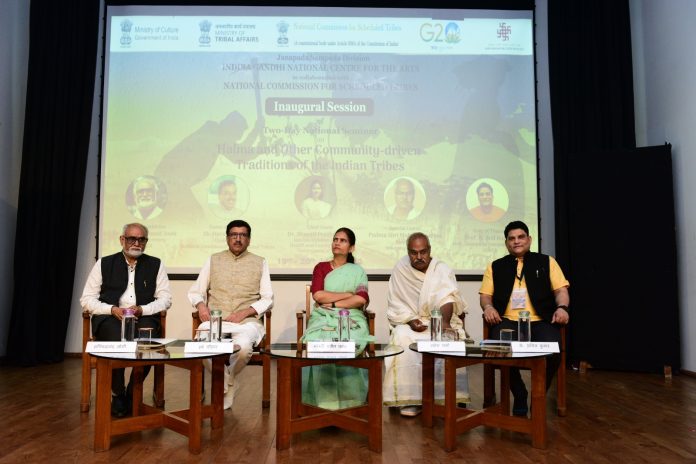
“Halma is for everyone and with everyone”. Dr. Bharati Pravin Pawar
19th June, New Delhi:
Halma is a tradition of the tribal that gives the message of help to a person in distress. To bring out the relevance of such a tradition in contemporary times, Indira Gandhi National Centre for the Arts, Janapada Sampada Division in collaboration with National Commission for Scheduled Tribes held a National Seminar on the topic ‘Halma and Other Community- driven Traditions of the Indian Tribes’ here at Samvet auditorium, IGNCA. The chief guest of the inaugural session of the national seminar was Dr. Bharati Pravin Pawar, Hon’ble Minister of State for Health and Family Welfare, Government of India. The guest of honour was Sh. Harsh Chouhan, Chairperson of, the National Commission for Scheduled Tribes, and a special guest at the seminar was Padmashri Mahesh Sharma, Founder, of Shivganga Jhabua. Dr. Sachichidanand Joshi, Member Secretary, IGNCA was also present during the occasion.
While speaking at the event Dr. Pawar praised IGNCA for organizing a seminar on such a relevant topic. She further reiterated that traditions like Halma can help us face the challenges of climate change and global warming in contemporary times. She cited examples of how Halma has helped in the development of roads and other infrastructure in the region where it is practiced. The traditions such as Halma and others like it teach us not to be dependent on others but rather make us self-reliant and self-dependent, added Dr. Pawar during her address. She further said that “Halma is for everyone and with everyone”. She also said that traditions like Halma exist in our society and we need to identify more such traditions and practices and bring them to the mainstream for the holistic development of our society. At the end of her address, she said that if we have to work in the right direction, then we need to connect with such traditions and work with the spirit of ‘Earth belongs to all’. When we are presiding over the G-20, such traditions, and practices become more relevant. In this context, quoting from the Prime Minister’s address, she said that our philosophy of ‘Vasudhaiva Kutumbakam’ is important for the world in contemporary times.
Later Sh. Harsh Chouhan while speaking at the occasion said in context to tradition like Halma that our society doesn’t depend on the basis of contract; we do not accept it as a norm. In our society social work is not charity work, rather it is a way to live with self-esteem and that is the reason why we are independent in our thought process. Our traditions and our philosophy are to evoke ‘Parmarth’ (Philanthropy). He further emphasized one can’t do social work by invoking self-interest; it will come to us without any vested interest. Tribal society believes and has institutionalized the thought that it is them who are the nature they work with the feeling of community development, said Sh. Chouhan. He also said that in our society traditions like Halma are an example of community participation and sustainable development. Padmashri Mahesh Sharma was also present on this occasion, who had come to Jhabua 25 years ago (in 1998) to study the tribal ecosystem. Over the years he has developed a deep understanding of the tribal ecosystem and now has a network of over 800 villages. He has played an important role in bringing the tribal’s together. Dr. Sachichidanand Joshi speaking earlier at the seminar said that traditions like Halma are education in social work which emanates out of our Indian philosophy and core beliefs. In the end, Prof. K. Anil Kumar extended a formal vote of thanks to the esteemed guests, scholars, students, and audience present in the auditorium. Later in the afternoon session papers on different aspects of Halma tradition were presented by scholars who came from different parts of the country. The second day of the national seminar will continue on 20th June.





















